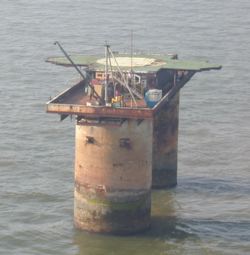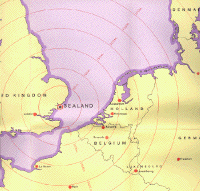We are developing the social individualist meta-context for the future. From the very serious to the extremely frivolous... lets see what is on the mind of the Samizdata people.
Samizdata, derived from Samizdat /n. - a system of clandestine publication of banned literature in the USSR [Russ.,= self-publishing house]
|
I suppose one of the chief attractions of being in the apocolypse business is that nobody can ever prove you wrong. If the catastrophe you have predicted doesn’t happen this year, well, there’s always next year. Point in case being this starkly gloomy article in The Spectator from a certain Sanjay Anand:
No one in any Western intelligence service knows how or when it will come, but they are all agreed on one thing: al-Qa’eda will attack using chemical, biological and nuclear weapons the moment it can acquire them. And that moment is not far off. As Eliza Manningham-Buller, the head of MI5, said on Tuesday, ‘It is only a matter of time before a Western city is hit by a chemical, biological or radiological attack.’ She added that renegade scientists, probably from Pakistan, were already thought to have given al-Qa’eda most of the technology it needs for ‘dirty bombs’.
Certainly this is not the first time that such melancholy warnings have been issued but the broad scope of these ones make me wonder if the ‘Western Intelligence Services’ are engaging in a bit of back-covering here. Not Mr.Anand though. He is very adamant:
We don’t know when the next attack will happen, or what horrors it will involve. We can depend on one thing, however: the moment we relax our guard, we will be hit.
That certainly fits Al-Qaeda’s modus. They do like popping up with an attack whenever and wherever they are least expected and, hence, prepared for. From a strategic point of view they do need to do something big and spectacular and reasonably soon. It should be borne in mind that Al-Qaeda’s attacks are not a message to the West, they are designed to boost the moral of the wider Muslim world (the ‘Umma’) by reassuring them that the ‘infidel’ is vulnerable and can be beaten. Following the pants-down rout of the Iraqi regime, Al-Qaeda are under pressure to respond in style, lest their legend being to fade and the support that they count on among the people they consider to be their constituents begin to trickle away.
But, perhaps, they are no longer able to function at that level. Who can say what damage the work of Western security forces has done? Mr.Anand is rather dismissive but, then, he needs to be in order for his article to retain any punch. Clearly the editors of The Spectator felt it important enough to give it front-page prominence.
Even pre-supposing I had a back garden (which I do not) I am not about to begin digging it up in order to construct a concrete bunker. But neither can I entirely dismiss Mr.Anand’s dire warnings with anything like the necessary degree of confidence.
As a lot of people are aware, the new Harry Potter book, Harry Potter and the Order of the Phoenix goes on sale at midnight tonight. In the UK, the recommended retail price of the book is £16.99, which is fairly typical for a new hardback novel (although expensive for a children’s book). However, Britain’s booksellers are using it as a loss leader, and it is thus going to be available for much less than this. Amazon is selling it for £8.49, and the cheapest I have seen it advertised in a shop with physical premises is £9.99.
Judging by the prices of the other books in the Harry Potter series, the paperback edition of the new book is likely to sell for £7.99 (when it comes), so the effect of all this discounting is that the hardcover of the new book is selling for close to the price of a paperback. Obviously this is good. Consumers will be saving money. Poor people (or cheap people) who normally wait for the paperback in order to save money will be able to buy the hardcover, thus saving their children from social death. There will be happiness and light in the world. Capitalism is a fine thing.
Remarkably, as recently as 1995 this discounting would have been illegal. Believe it or not, book prices in the UK were fixed. Under something called the Net Book Agreement, it was actually illegal for a bookseller to sell a recently published book at any price other than the one set by the publisher. Supposedly, this was so that publishers could make money from popular books and thus subsidise more “worthy” books, or something. (In reality, it protected specialist bookstores from supermarkets and other stores that merely stocked a few bestsellers). When the price fixing was abolished, various literary establishment figures came out of the woodword and said how terrible this was. I remember some famous author (Harold Pinter?) saying something like that removing price fixing on books would “Lead to a decline in the number and quality of books published in the UK. In fact, we will end up will a lowest common denominator publishing industry like the one we have in America”.
And my goodness, we couldn’t have that, could we. What fate could possibly be worse than being like America?
In any event, British bookbuyers (many of them children) over the next couple of days will save a total of something like £25 million due to the demise of the net book agreement. Politicians often favour indirect subsidies over direct ones because indirect ones (although always actually more expensive) are often hard to quantify. It’s always interesting when an event like this gives you some actual numbers for an indirect subsidy. £25 million is a lot of money. You could buy David Beckham for that.
This from today’s (well yesterday’s now ? I was trying to get something up before midnight) Telegraph:
Robert Mugabe is considering stepping down as Zimbabwe’s president within a year under “certain conditions”, South African government sources said yesterday.
His demands include the right to nominate his successor and international and local recognition that he remains the country’s properly elected founding president to enable him to enjoy “honourable retirement”, they said.
The 79-year-old autocrat, whose obsession with clinging to power has brought his once-prosperous nation to the edge of economic collapse and political chaos, is said to have assured President Thabo Mbeki of South Africa of his retirement plans in a telephone call last week.
Mr Mbeki sees Mr Mugabe as a major impediment to his dream of successfully launching Nepad – the “new partnership for Africa’s development” under which African nations commit themselves to good governance in return for international financial aid.
Mr Mbeki was said to have been enraged by images emerging from Zimbabwe of Morgan Tsvangirai, leader of the opposition Movement for Democratic Change being hauled before court in chains to face a second charge of high treason for organising protests against the Mugabe government.
According to sources, Mr Mbeki told Mr Mugabe of South Africa’s “displeasure”.
What a world of misery and sleaze is captured in these few paragraphs.
And how about Nepad? Don’t they realise that “Nep” is the start of other words, which suggest anything but “good governance”, but which instead involve such practices as nominating one’s successor from within the ranks of one’s own family? → Continue reading: Africa? A suggestion
The key reason why I oppose boycotting French businesses is because it is counterproductive. Some of the boycotters just avoid French goods to make themselves feel better. But many boycott with the idea that somehow this will get the French to be more supportive of America in future. They are mistaken.
The effect of fewer American tourists on the streets of Paris is to cut the interaction between ordinary French people and ordinary Americans. It eliminates those conversations in which the American tourists say, “Well, I can understand why you opposed the war, but I’m very pleased that Saddam can’t kill any more people.” It reduces understanding between the two peoples. It makes the French less reliant on trade with America, helping to make America more distant and easier to demonise. It encourages anti-Americanism.
In short, boycotting the French is a mistake.
One of the more feeble but less important things about the euro is the actual design of the banknotes. It was decided early on that the notes would show pictures of bridges, supposedly to symbolise “the close cooperation between Europe and the rest of the world”. However, due to the fact that there were not going to be enough notes to show a picture of a bridge from each Euro-zone country, the notes were instead designed with pictures of bridges that don’t actually exist, but which resemble (in terms of style) bridges that do exist somewhere in Europe. (To my eye, a remarkably large number of them resemble real bridges that are actually in France, but that might be just me). So, rather than drawing attention to the great cultural treasures that do in fact exist in the euro-zone, European money instead gives us a sort of homogenised blandless.
(Euro coins have one common side and one side that the country that would issues the particular coin into circulation can do what it likes with. Just as with the state quarters in the US, which the states got to design, the quality of the designs is variable).
In any event, it was nice to see on the front page of this morning’s Times (which Samizdata does not link to) that the people who design British coins do not go for such blandness. From 2004 to 2007 Britain (assuming it does not join the euro) is going to release a series of four new pound coins showing great British bridges.

Of course, issues of everyone getting their turn come into this, too. As England, Scotland, Wales, and Northern Ireland all use the same coins, one of the four coins has to feature a bridge from each of the four constituent countries of the United Kingdom. (Curiously, the situation with the pound is the precise reverse of that with the euro. All of the UK uses the same coins, but England, Scotland, and Northern Ireland all have different banknotes).
This is where we get to the interesting part, which is the choice of bridges on the coins. Choosing for Scotland and Wales was undoubtedly very easy. Benjamin Baker’s Forth Bridge and Thomas Telford’s Menai Strait Bridge are so famous that it can’t have taken more than a moment to choose them. As for Northern Ireland, we have the rather more obscure Egyptian Arch from the Belfast-Dublin railway. Sadly, there are no really famous bridges in Northern Ireland, so we have to make do with what we have. I would rather a more famous bridge from somewhere else in the UK on the coin, but I guess Northern Ireland has to get a coin.
As for England, we have the very new Gateshead Millennium Bridge. This choice doesn’t impress me greatly, as I think the new bridge is more a piece of urban decoration than a piece of important infrastructure. (It illustrates that with modern super-strong materials, engineers and architects designing urban footbridges suddenly have immense freedom to be playful with the design of such bridges, as almost anything they can imagine has suddenly become technically possible and affordable. This is an interesting story, I am all for urban decoration, and I think the bridge is a very good example, but am not sure that this bridge is the right choice for a series of coins that celebrates great bridge building.
So what would my choice for the “England” bridge be? → Continue reading: Euro notes, British coins, and a tour of Britain’s finest bridges
Last night Samizdata.net’s illustrious blog suddenly went tits-up for a while. For some reason half of the main index template just… disappeared.
The blog had been exhibiting some odd behaviour (and I am not referring to the writing style of Gabriel Syme) and so I started poking around inside to see what was amiss.
So when the site went splat a few minutes after I started looking around, I thought I had accidentally screwed the pooch in some fit of mouse-wielding madness as I noticed a huge chunk of the main index was just…gone 
But I soon realised that the part of the template which vanished into hyperspace was nowhere near where I was messing around (and in any case, all I did was remove a spurious line break). Has anyone out there even had this sort of thing happen to them in Moveable Type?
We may have lost a few sidebar links, so if you notice your blog has been de-linked, please let us know and we will reinstate it. And yes, I will be backing up far more often in future!!!
Oh, and by the way… let me extol the greatness of the Queen of the Goddamned Internet, Stacy Tabb who de-lobotomised our belovéd blog in record time 
In a comment on this posting by David, I promised to say when Sean Gabb’s then promised piece on the abolition of the office of Lord Chancellor by the current British government appeared.
It has now appeared.
What is interesting is Gabb’s objection to this move. He doesn’t mind all that much when it comes to substance. What he dislikes is the abolition of the office itself, that is to say of its title.
Such moves, says Sean, and there have been many others, cut us off from our past and destroy our sense of our national history. And this is probably deliberate, he says. It is an article, you might say, about the power of words.
But don’t take my word for it. Read the words yourself. It’s quite short.
The sharp eyed and attentive amongst you may have spotted the funky monkey that has appeared in the ‘free market’ section of our sidebar… we have acquired a sponsor!
But not just any sponsor.
The Gold Casino is an off-shore internet casino (obviously) in the most literal sense of the term. It is located on a server in the Principality of Sealand, a fully independent micro-state off the shore of Great Britain. Don’t like the state? Go set up your own.
No I am not joking!

Well I did say micro-state, didn’t I?
So take a peak at what our sponsor is offering by poking the funky monkey and check out their message via the link underneath the sidebar graphic. I assure you it is far more interesting that the usual marketing blather one is usually confronted with… you will see why we find them so ideologically agreeable!

It adds a whole new nuance to the term ‘off-shore business’
A year ago, Simon Davies of Privacy International had an opinion piece in the Telegraph pointing out how vulnerable ID systems are. His arguments are as valid now as they were a year ago, however, the government has recently intensified its call for compulsory ID cards.
Corruption […] besets most official ID schemes from Australia to Thailand. High black-market demand and huge investment by criminals entices officials to bend or break the rules of eligibility. An ID card system is a gift for corrupt civil servants or contract staff in search of extra cash.
[…] the technology gap between governments and organised crime has now narrowed so much that within weeks of their introduction even the most secure ID cards can be available in the form of blanks onto which individual identity information can be incorporated.
What a gift this would be for criminals. Whereas before they might have carried a copy of a dead person’s birth certificate, and maybe a driver’s licence and a savings bank number – all of which could be checked – they would now possess the ultimate no-questions-asked ID. They would have penetrated the plastic wall of security. Once inside they are safe.
On the positive side, Simon Davies points out, this would keep the Home Secretary busy, as in due course he will be able to announce yet another one of his crackdowns – on ID card fraud.
Here is a quote from an opinion piece by David Heathcoat-Amory MP, the Tory party representative on the convention, published in the Telegraph:
No one in the convention doubts the scale of the undertaking or the huge implications for the way Europe is governed – except, apparently, the British Government, which is completely isolated in maintaining that the new constitution is just a “tidying-up exercise”. In the convention, this caused bafflement and then some hilarity. Peter Hain, the government representative, belatedly declared a number of “red lines” on proposals that he wants removed, such as majority voting on foreign policy, social security harmonisation, and interference in criminal justice procedures. But if these issues are so important to the Government, how can it just be a “tidying-up exercise”?
The truth is that the European Constitution founds a new union, with a single unified structure and legal personality. The existing structure, which secures the rights of member states to make their own decisions and collective arrangements about foreign policy and criminal justice matters, will disappear. The EU will have “exclusive competence” over trade, competition rules, common commercial policy, fisheries conservation and the signing of all international agreements.
Please read the whole article, it’s terrifying in its clarity. To be honest, I don’t know which bit I find more scary. The one about the changes to the UK legal system:
The EU’s proposed criminal justice powers are particularly striking because they allow for harmonisation of national laws and procedures by majority voting. This obviously goes to the heart of domestic policy, particularly for a country such as Britain with a distinctive common law tradition, including jury trials, habeas corpus and rules of evidence that differ from those in most other EU countries.
Or the one about foreign policy:
Foreign policy, which is at present decided between national governments, will change completely. The new foreign minister will “conduct the Union’s foreign policy”. There is provision for majority voting on policies recommended by the foreign minister.
None of the above is new and has been bemoaned on Samizdata.net many times, but it gets more frightening as the process of EU imposition on the UK progresses…

On this day, nearly two hundred years ago, the artillery, cavalry and red coated infantry of Britain, along with their Dutch and Prussian allies, finally put an end to the tyrannical rule of Napoleon Bonaparte on the Belgian wheat fields of Waterloo, near Brussels. It was the Duke of Wellington’s greatest triumph.
Given that this blog is of course, such a great fan of the French political class (heh), I trust no readers of this publication would be so vulgar and unsophisticated to point out this salient historical anniversary to their friends and colleagues today.
I just thought you would like to have this titbit of historical information, gentle reader.
“Up Guards, and at ’em!”
– Wellington, June 18th 1815


Responding to a posting a fortnight ago on CrozierVision, I posted a piece the day before yesterday on my (Brian’s) Culture Blog entitled Do blogs convert people? Jonathan Wilde commented on that piece in a manner which suggests that the early editorial meetings concerning Samizdata may have been bugged. By Jonathan Wilde. He certainly gets what we’re trying to do here:
As I stated in my original post on Patrick’s entry, I do believe that blogs at least influence people, if not convert them. Yet. I was a libertarian prior to finding Samizdata, but over the 18 months or so that I have been reading Samizdata, I have been directly influenced by what I have read. I used to be a reluctant voter thinking that to be a libertarian meant being a Libertarian (i.e., member of the American Libertarian Party) and that taking part in the political process was the only way to be a libertarian. When I read Samizdata, I saw people who didn’t really care that much which political party was in power, but were in the business of changing ‘meta-contexts’ and going around the state, rather than through it. Further, I saw people who were influenced by Mises, Popper, and Hayek rather than the usual Rand and Rothbard that you find in America, yet arrive at the same basic conclusions on most issues. I saw people who were proud of Western culture. I saw people who were proud of defeating the Nazis in WWII rather than simply seeing it as just another state war, with all of its side-effects. These were all things that made me believe that it was okay to be a libertarian and agree with those ideas.
Since this is a culture blog, let me mention that the ‘culture’ of Samizdata had a lot to do with its success. Yes, the brilliant writing on the blog is vital to convert readers. But the culture is also essential. Pictures of Samizdatistas drinking, acting goofy, fondling women, and making fun of war protestors gives the impression that libertarians aren’t angry gun nuts from Montana (the stereotype in America), but are simply regular, everyday people.
And the last way in which Samizdata influenced me is to start my own website with similar characteristics – a group blog focused on Austrian economics, with a ‘laid-back’ non-angry-gun-nut atmosphere, and periodic ‘off-topic’ content.
I was already a libertarian, and perhaps I’m not the best example of blogs influencing, if not converting people, but the blogosphere is young. If our ideas are better than the rest, then they will rub-off with time. After hearing Perry being on a forum with ‘mainstream’ media on BBC last week, I really think that Samizdata has a chance to be something special. And it’s a classic libertarian strategy: carve a new niche, go around the established paths, and succeed on what you do best. The blogosphere is the new niche, and Samizdata is at the top.
Jonathan Wilde
|
Who Are We? The Samizdata people are a bunch of sinister and heavily armed globalist illuminati who seek to infect the entire world with the values of personal liberty and several property. Amongst our many crimes is a sense of humour and the intermittent use of British spelling.
We are also a varied group made up of social individualists, classical liberals, whigs, libertarians, extropians, futurists, ‘Porcupines’, Karl Popper fetishists, recovering neo-conservatives, crazed Ayn Rand worshipers, over-caffeinated Virginia Postrel devotees, witty Frédéric Bastiat wannabes, cypherpunks, minarchists, kritarchists and wild-eyed anarcho-capitalists from Britain, North America, Australia and Europe.
|









